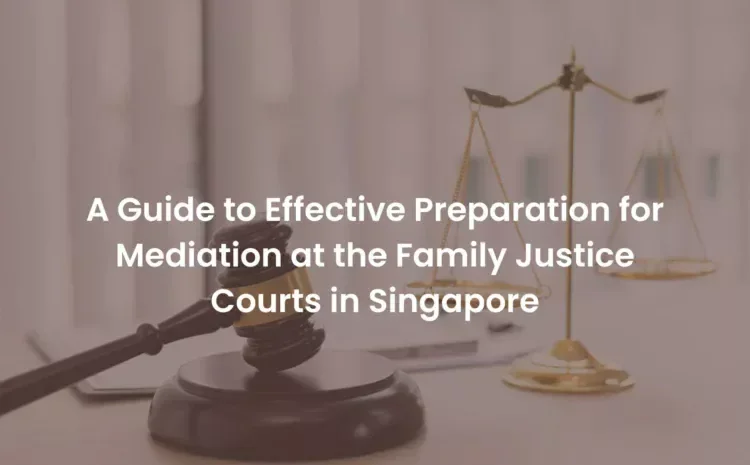A Guide to Effective Preparation for Mediation at the Family Justice Courts in Singapore
Mediation plays a vital role in the resolution of family disputes at the Family Justice Courts in Singapore. It provides an opportunity for divorcing couples to reach mutually acceptable agreements on various issues, including child custody, division of assets, and maintenance. Proper preparation for mediation can greatly enhance the chances of a successful outcome. In this blog post, we will provide a comprehensive guide on how to prepare effectively for mediation at the Family Justice Courts in Singapore.
Understand the Mediation Process: Familiarize yourself with the mediation process to have a clear understanding of what to expect. Research the guidelines and procedures followed by the Family Justice Courts. Gain knowledge of the roles and responsibilities of mediators, as well as the objectives and principles of mediation. This understanding will help you approach mediation with the right mindset and set realistic expectations.
Clarify Your Objectives and Priorities: Identify your key objectives and priorities for mediation. Consider the various issues at hand, such as child custody, visitation rights, financial matters, and property division. Reflect on your desired outcomes and determine your preferred solutions. Having a clear understanding of your priorities will enable you to articulate your needs effectively during the mediation session.
Gather Relevant Information and Documents: Compile all relevant information and documents pertaining to the issues under discussion. This may include financial records, property documents, agreements, and any other evidence that supports your position. Organize and present this information in a clear and concise manner, ensuring that it is easily accessible during the mediation session. This will help you present your case more effectively and facilitate productive discussions.
Seek Legal Advice: Consult with a family lawyer to understand your legal rights and obligations. A lawyer can provide valuable guidance on the legal aspects of your case, help you understand the implications of various decisions, and advise you on potential outcomes. They can also assist in drafting proposals, reviewing agreements, and representing your interests during mediation. Legal advice will ensure that you make informed decisions and protect your rights throughout the process.
Consider Your Child’s Best Interests: If child custody and visitation are involved, focus on the best interests of your child. Consider their welfare, emotional needs, and developmental requirements. Prepare a proposed parenting plan that addresses their well-being and outlines practical arrangements. Be open to discussing and negotiating with the other party, keeping the child’s best interests at the forefront.
Practice Effective Communication: Develop effective communication skills to facilitate productive discussions during mediation. Be prepared to listen actively to the other party’s perspectives and concerns. Express your own thoughts and feelings clearly, calmly, and respectfully. Avoid confrontational language or behaviors that may escalate tensions. By maintaining open and constructive communication, you can foster a more collaborative and amicable atmosphere during mediation.
Maintain a Flexible Attitude: Approach mediation with a willingness to find common ground and compromise. Be open to alternative solutions and creative options that meet both parties’ needs. Flexibility and willingness to consider different perspectives can help in reaching mutually beneficial agreements. Remember that mediation is a collaborative process, and a flexible attitude can contribute to a successful outcome.
Conclusion: Effective preparation for mediation at the Family Justice Courts in Singapore is essential to maximize the chances of a successful resolution. By understanding the mediation process, clarifying your objectives, gathering relevant information, seeking legal advice, prioritizing your child’s best interests, practicing effective communication, and maintaining a flexible attitude, you can approach mediation with confidence and work towards finding mutually acceptable solutions. Remember that the goal of mediation is to facilitate constructive dialogue and reach agreements that promote the well-being of all parties involved.
Come speak to our lawyers at 8780-2499 on how mediation in Court will help your divorce settlement.

